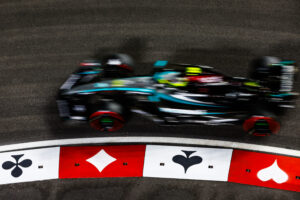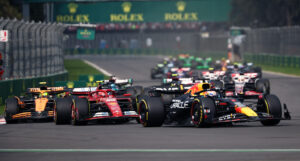Greg Biffle is the face of Roush-Fenway Racing. However, that could soon change unless he can improve his on-track performance. The Vancouver, Washington native has spent his entire career with Roush, winning two NASCAR-sanctioned championships. In a recent interview prior to the Kansas Chase race, Biffle alluded to a potential retirement from the sport if he is unable to run near the front consistently. As the 2016 is winding down, Greg Biffle retirement talks are picking up.
Greg Biffle Retirement Talks: Future in NASCAR Will be Based on Results
Biffle To Consider Retirement if Results Don’t Improve
Greg Biffle used to be the definition of consistency. Over the last three years at Roush-Fenway Racing as the team restructures, however, Biffle has struggled significantly. In the last two years, he has failed to record double-digit top 10s in a season. Biffle went as far as to call out the organization at a race in California last season. This after Biffle and his teammates Trevor Bayne and Ricky Stenhouse Jr., unloaded with cars that were not up to a competitive standard.
Roush was once dynamic five drivers (Biffle, Mark Martin, Matt Kenseth, Kurt Busch and Jeff Burton/Carl Edwards) that would consistently push other powerhouse teams like Hendrick Motorsports. The team battled for wins and championships. The cast of five dynamic drivers has been reduced to one veteran in Biffle and two largely-unproven young drivers in Bayne and Stenhouse Jr. Biffle is the leader and expects to still have good race cars and be a strong team. As the leader, he will speak up if something needs to change. The 2014-16 seasons show that the team is clearly heading in the wrong direction. If this does not change, Biffle may walk away from NASCAR entirely.
Early NASCAR Career
Greg Biffle started his NASCAR career later than most drivers. He started two races in 1996 in the Busch Grand National (now Xfinity) Series at the age of 26. Two years later, his relationship with Jack Roush came to fruition with a Truck Series opportunity, and he’s never looked back. As a rookie, Biffle notched eight top fives and 12 top tens, good for an eighth place points finish.
In 1999, Biffle got his first NASCAR victories, and there were a lot of them. Biffle grabbed nine checkered flags in the Truck Series and finished second in points. Roush knew he had a star in the making. Biffle continued his rapid ascent up the NASCAR rankings by winning his first championship at the turn of the century, winning five races and averaging close to a fifth place finish all season. Winning a championship proved to Roush that Biffle was ready for the next level.
In 2001, Biffle began racing in the Xfinity Series full time. His rookie season consisted of five wins, 21 top 10s and a fourth place finish in points. The problem for Biffle that season was he was going up against the likes of Kevin Harvick and Jeff Green, who dominated that series in that time. Perhaps in a different year Biffle could have won the championship in his rookie season. Nevertheless, it helped raise Biffle to another level the following season, where he did succeed in capturing the championship. Biffle won fewer races but was more consistent with more top 5s and top 10s. The Xfinity championship was his second NASCAR championship and was poised to become the first driver to win a championship in all three of NASCAR’s top divisions.
Cup Series Career
There have been two seasons where Biffle had a legitimate shot at achieving this title landmark. In 2005, Biffle was in his third Sprint Cup season, which can be considered the start of his prime. In just the second race, the veteran Roush driver won at Auto Club Speedway, asserting himself as a championship favourite. He made the Chase as the number two seed but after getting caught up in a wreck at Talladega.
Along with poor finishes at Martinsville and Texas, he was put too far back to catch eventual champion Jimmie Johnson. The icing on the cake of the still successful season was a victory in the finale at Homestead, upping his rank from fourth to second in the standings. The second opportunity for Biffle was in 2008. Again, inconsistent finishes down the stretch in the Chase, coupled with Johnson’s torrid Chase dominance, left Biffle falling just short of the mark. He hasn’t been close since.
Assessment
Perhaps Biffle entered his prime at the wrong time, when the duo of Jimmie Johnson and Chad Knaus asserted themselves as legends in the sport. Perhaps Biffle’s racing style was not fit to win in a Chase format. What cannot be disputed are both the driver’s talent and the team’s ability. Biffle had the tools to be successful and Roush gave him fast cars he could drive. Since the restructuring, there is a noticeable drop off. Ricky Stenhouse Jr. won two Xfinity titles with Roush, but the Cup Series program has been a trying experience. Biffle is getting older but he is not any less talented. When the team does play strategy late in a race, Biffle is able to still run up front and hold his position, and even drive away. The issue is being at the front to start a race.
What Does the Future Hold?
Biffle discussed his future in a press conference at Kansas.
“I want to be competitive and win races and run in the top 10. If I’m not doing that then I’m probably going to do something different. I’ve spent a lot of time winning races and running up front and a driver knows he won’t do that every weekend. If I’m competing at that level, then I’m going to keep doing it.”
Hendrick driver Kasey Kahne has had similar feelings about his own racing program and the lack of results with the number 5 team. But Kahne is not 46 years old like Biffle is. Not every driver can race into their fifties like Mark Martin. Jeff Gordon realized this. Tony Stewart realized this. If Biffle cannot find success in his contract year in 2017, perhaps he will call it a career. There have not been any talks of post-career plans but re-joining Roush-Fenway in a management position would be the perfect place for him. While Biffle may fall short of his pursuit of a championship in each of NASCAR’s top three series, he has left a positive mark in the sport as a loyal icon to Roush Racing and Ford, for making it a powerhouse brand in the sport for many years.






